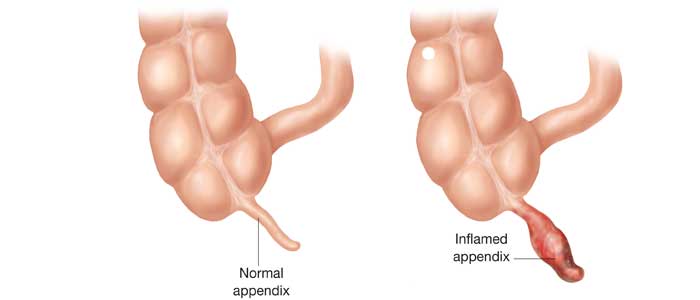Appendicitis, or the inflammation of the appendix, is a condition that will require medical attention as quickly as possible so it's important to be able to recognize its symptoms. This will allow you to differentiate this disease from an everyday stomach ache so that you can get your child the medical attention they need in a timely manner.
What Is Appendicitis?

The appendix is a small organ which is attached to the large intestine where it sits in the lower right of the abdomen. This finger shaped organ opens into the large intestine, forming something of a cul-de-sac. Hard stools known as fecoliths, inflammation of the lymph nodes near the intestines and some parasites can block the appendix. When the appendix is blocked, bacteria can become trapped inside which can cause the organ to become inflamed and overgrown. It is important to note that this condition is not contagious.
Once the appendix becomes inflamed and infected it will have to be removed. Otherwise it may burst and spread this built up colony of bacteria throughout the body. Infections caused by a ruptured appendix can be extremely severe. They can spread throughout the abdomen, leading to a condition known as peritonitis, or form an abscess, or a pus infection, in the abdomen.
Children and teens between the ages of 11 and 20 are some of the most likely candidates for developing appendicitis. Appendicitis is one of the most common causes of emergency abdominal surgery in this age group. The condition is quite rare in infants.
How Can You Know If Your Child Has Appendicitis?

Appendicitis in children typically begins with pain around the bellybutton area and a mild fever. As the condition progresses this pain can get worse and will start to spread down to the right side of the abdomen. This pain will come and go, but become increasingly frequent and sharp as the condition worsens. A child with appendicitis may also suffer from:
- Constipation
- A bloated or swollen abdomen (most common in infants)
- Loss of appetite
- Nausea or vomiting
- Diarrhea in small amounts, often filled with mucus
- Low fever
Symptoms will vary based on the age of the child. Those under the age of two are more likely to vomit and develop swelling or bloating in the abdomen which will be accompanied by pain. Nausea, fever or diarrhea accompanied by pain is more common in older children.
Once these symptoms appear, it is essential that you get your child medical attention as quickly as possible. Do not allow your child to have anything to eat or drink before the child see a doctor unless a medical professional instructs you to do so. In the case that appendicitis goes untreated, the organ can burst within 24 to 72 hours of the symptoms taking hold. Once this occurs, the pain which has impacted the child will spread to the entire abdomen and your child will likely develop an extremely high fever.
There is no prevention for appendicitis, but in many cases the condition can be treated with antibiotics if it is caught early. Improvements in diagnostic tests are allowing doctors to pick up on appendicitis symptoms before they become severe enough to merit surgery.
Diagnosing Appendicitis in Children
Many symptoms of appendicitis are very similar to those exhibited by other conditions such as pneumonia, urinary tract infections or kidney stones, so it can be difficult to officially diagnose appendicitis at first. In order to officially determine if a child is suffering from appendicitis, a doctor will perform an examination of the abdomen to check where the tenderness and pain are coming from. Blood or urine tests may be ordered to help eliminate other conditions. Examinations such as x-rays ultrasounds or CAT scans may be used to further narrow down the possible conditions which could be causing the discomfort. At this point, a doctor may tell you to restrict your child from eating or drinking in case surgery becomes necessary.
Treating Appendicitis in Children
Once it has been determined that your child is suffering from appendicitis, the doctor will order an appendectomy to remove the inflamed appendix. This can be done by making an incision in the abdomen using a laparoscope to create a smaller opening where the organ can be removed. A two to three-day hospital stay is necessary after this operation to monitor your child's recovery. If the appendix has burst, treatment will be largely the same, though your child may need to stay in the hospital for a longer length of time to treat the bacterial infection that has spread to the rest of their abdomen.
During the surgery and recovery period your child will use an IV that provides a steady stream of antibiotics. This will reduce the risk of your child developing an infection near the site of their wound after the surgery is completed. Pain medication will also be administered as needed.
